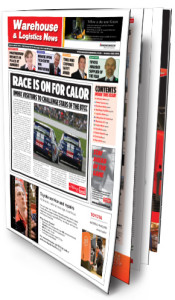 Welcome to the 15 October Warehouse & Logistics News. As we went to press the big news of the day was the Chilean mine rescue. Its dramatic happy ending will no doubt inspire a Hollywood blockbuster, transplanted to industrial Pennsylvania and starring Bruce Willis, Samuel L. Jackson and John Travolta. Meanwhile everyone who works in industry in the UK must ask themselves the serious question: what can we learn from this episode about workplace safety?
Welcome to the 15 October Warehouse & Logistics News. As we went to press the big news of the day was the Chilean mine rescue. Its dramatic happy ending will no doubt inspire a Hollywood blockbuster, transplanted to industrial Pennsylvania and starring Bruce Willis, Samuel L. Jackson and John Travolta. Meanwhile everyone who works in industry in the UK must ask themselves the serious question: what can we learn from this episode about workplace safety?
Read the ‘October 15th’ digital edition
SIGN UP TO THE REMINDER SERVICE
Inspiration is preferable to regulation in making people do things better, and in this issue we’ve got features on Buildings/Facilities, Lifting Gear & Cranes and Power Sources, to give you fresh ideas for your business. ‘Buildings/Facilities’ covers main structures and key equipment, including temporary structures. ‘Lifting Gear & Cranes’ goes from scissor lifts through to heavy-duty cranes, and Power Sources Covers all aspects of power sources in the warehouse environment, including batteries.
Warehouse operators don’t send people deep underground, or (generally) ask them to work in high temperatures and humidity. But without being too melodramatic, there are still dangers lurking there. Warehouse staff risk being crushed under collapsing racking and shelving, if it’s not regularly inspected and maintained; falling off docking bays and being injured, or worse; or hit by a speeding forklift whose operator is under pressure to hit tough productivity targets in a busy warehouse. And of course if your warehouse staff move goods by hand, without suitable materials handling equipment, there’s the risk of potentially crippling, long-term injury and time off work.
As hard-bitten employers know, we’ve had legislation for decades to prevent work-related injuries, illnesses and occupational fatality. These days we have Government bodies energetically issuing and enforcing standards for workplace safety and health. And not only that, there’s additional pressure from Brussels.
Chile’s industrialisation has happened relatively recently unlike Britain, with over 200 years of industrial development. But our industrial revolution had its share of disasters, much of it caused by people cutting corners on safety. And corners were certainly cut in Chile. As the Chilean President told the BBC, the company running the Chilean mine didn’t take good care of its workers. And the mine should have never been acting or working in the conditions they were, because there were no safety conditions to protect the lives and integrity of the workers.
The moral of the Chilean mine story is that the employer is ultimately responsible for workplace safety. Entrepreneurs are by definition risk takers, but their employees shouldn’t have to risk their lives so their bosses can succeed.
Warehouse & Logistics News




Comments are closed.